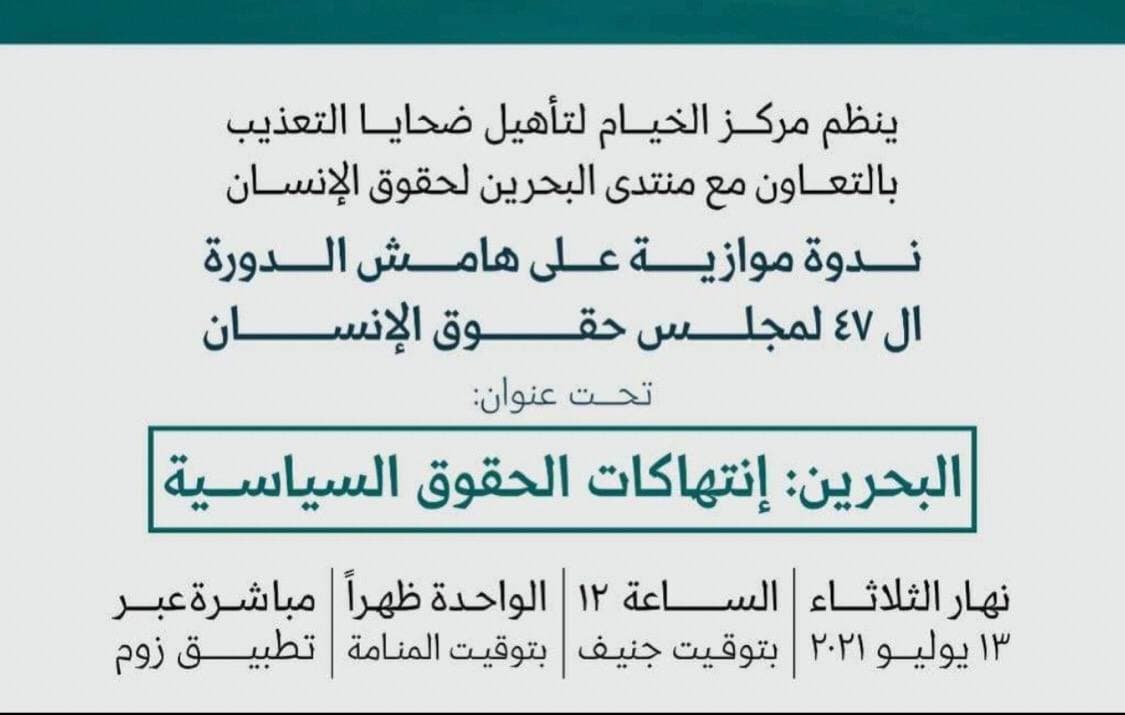|

A symposium by the Khiam Center and the BFHR at the Human Rights Council on violations of political rights in Bahrain To watch the symposium, click on the link below: https://www.youtube.com/watch?v=PL5TdlZwubA The Khiam Rehabilitation Center for Victims of Torture, in cooperation with the Bahrain Forum for Human Rights (BFHR), organized a symposium entitled “Bahrain: Violation of Political Rights,” on the sidelines of the 47th session of the Human Rights Council in Geneva. Baqer Darwish, Chairman of the BFHR, Sheikh Muhammad Khojasteh, member of the Islamic Scholars Council, and lawyer Khalid Al-Sufyani, the general coordinator of the Islamic National Conference, spoke at the symposium, which was managed by Ghina Rebai, a researcher at the BFHR.
At the opening of the symposium, Rebai said that in Bahrain, the authorities apply the principle of “the authorities are the source of the people” by suppressing and punishing the dissidents, revoking the citizenships of hundreds of citizens, and naturalizing foreigners in huge numbers, in violation of the law, and giving them privileges at the expense of citizens. In addition, they dissolve opposition political societies, and deprive their figures of running for office in what Rebai called the "sham elections." She added that in Bahrain, political rights are stolen from the citizen, and citizenship is deficient. Darwish: Not granting citizens the political right means that prison doors will remain open As for the Chairman of the Bahrain Forum for Human Rights, Baqer Darwish, he said in his speech that addressing the human rights crisis in Bahrain fundamentally is not only achieved by stopping arrests, enforced disappearances, and torture, but also by correcting the conditions of rights and freedoms (primarily the political right), as well as reforming the judicial institution that should be Independent and fair. Darwish added that there should be a fair electoral system, and constitutional reform, as is the case with the procedures followed by the United Nations in providing technical assistance to countries in transitional periods. “Addressing the problem of the political right is the way to correct human rights conditions instead of resorting to patchwork procedures, which are done by the authorities,” he said. Darwish added that the serious treatment is to address the causes of the crisis, otherwise, prisons will remain open, the judiciary will remain a platform for issuing rulings of political persecution, and state institutions will continue to practice ethnic, sectarian, and cultural discrimination and all forms of persecution and political oppression, unless the state takes a real and serious measure to correct the constitutional situation and guarantee the political right in accordance with the International Bill of Human Rights and the International Covenant, specifically the International Covenant on Civil and Political Rights, which was ratified by the authorities in 2006. Khojasteh: The main problem in Bahrain has resulted from the deliberate undermining of the political right In his comment, Sheikh Muhammad Khojasteh, a member of the Islamic Scholars Council, said that a decade has passed since the political, constitutional, and human rights crisis in Bahrain, and the forms of repression against the political community have developed. He added that the reports of human rights organizations have not stopped monitoring the new forms of violations that reflect the deteriorating human rights situation in Bahrain, which is what made Bahrain's human rights file present in international forums on an ongoing basis. Sheikh Khojasteh described this as the natural result of the decision to continue the official political repression, which generated one crisis after another, noting that the main problem in Bahrain has resulted from the deliberate undermining of the political right. He added that Bahrain has acceded to nine international agreements, however, it did not commit itself to harmonize the local legislation in real terms with those agreements in relation to political rights, and it marginalized the idea that the people are the source of power. Bahrain invented means and tricks to create a form of democratic rule, but it is "empty in content", as is the case with the House of Representatives, which lacks powers and has become unable to criticize a minister, according to Sheikh Khojasteh. Human rights reform is linked to constitutional reform, and the latter is based on guaranteeing the political right, Sheikh Khojasteh said, adding that unless the constitutional situation is corrected, the numbers of victims of violations will remain uncountable. Al-Sufyani: In Bahrain, whoever talks about the necessity of popular participation in decision-making becomes arbitrarily accused As for lawyer Khaled Al-Sufyani, the general coordinator of the Islamic National Conference, he said in his comment that the supposed freedom in Bahrain, which should be enjoyed by any people in the world, has become a scourge rather than being a right and providing dignity. He added that in Bahrain, whoever tries to exercise their freedom of expression or their freedom to talk about the necessity of popular participation in decision-making becomes an accused and loses the conditions of political life because of their stances and because they hold on to the exercise of their full freedom, whether stipulated in the constitution or not. Al-Sufyani also highlighted the necessity of the contractualism of the constitution, saying, “I understand that a constitution is a contract between the ruler and the ruled on clear grounds and principles. This contract does not exist at all in Bahrain, and all constitutions, constitutional chapters or constitutional amendments that came after the 1973 constitution were devoid of any consensus.” |